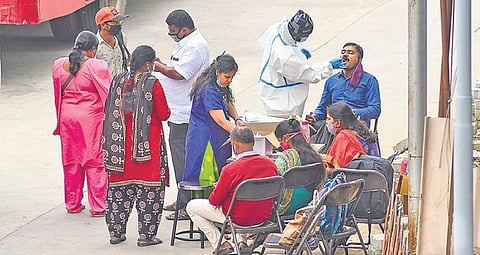

BENGALURU: An individual with Covid-19 symptoms is four times more likely to pass on SARS-CoV-2 to others than someone who remains asymptomatic, and the highest risk of infection comes from sharing a home with an infected person, according to new research by Imperial College London.Interestingly, a study published as a pre-print on the medRxiv server in September by senior epidemiologists in Karnataka including Dr Giridhara R Babu, Dr Narendra Kumar, Dr Ravi Vasanthapuram and others, also reported similar findings.
The study ‘Epidemiology of SARS-CoV-2 infection in Karnataka State, South India: Transmission dynamics of symptomatic vs. asymptomatic infections’, has been peer-reviewed and is likely to be published in a renowned medical journal soon, Dr Giridhara Babu, Covid-19 advisor to the state government, told The New Indian Express.
“We are happy that what we found a few months earlier is getting validated by investigators from Imperial College London. We had suggested some changes in testing strategies back then. This (new) study gives us more reasons to change (pandemic management) strategies soon,” said Dr Giridhara Babu, senior epidemiologist.
The study by researchers at Imperial College London and others titled ‘SARS-CoV-2 setting-specific transmission rates: a systematic review and meta-analysis’ also found that households show the highest transmission rates among indoor settings, compared to social gatherings, travel, health care, work place, and interactions with casual close contacts.
It also found that prolonged contact in households and other settings in which familiar close contacts interact, increase the potential for Covid-19 transmission.“With more people in Karnataka too opting for home isolation, people should be very careful and not be negligent if they develop symptoms. They must isolate with proper care,” a senior doctor said.
The Imperial College study found that chances of an infected person transmitting the disease to another person in the same house is significantly higher when the duration of exposure is more than five days, compared to five days’ exposure or less. “With many countries continuing to recommend ‘stay at home’ measures and with cases isolating inside households, our results show it is likely that this location will continue to be important in sustaining transmission,” Hayley Thompson, one of the authors, said in the research paper.
However, the researchers also noted that there was limited data reporting on transmission at workplaces, schools, and care homes, highlighting the need on research in that area.Andria Mousa, another researcher, said in the report, “Understanding the conditions where transmission is more likely to occur is essential in guiding policy interventions to reduce transmission whilst balancing the economic impact.”
These findings are crucial to fix strategies to test, trace and isolate people, Dr Giridhara Babu said. He said that they had recommended in September that Rapid Antigen Tests be done on symptomatic people and RT-PCR tests be done for all other people. “This was implemented in Karnataka four days ago. Now, it should be followed across the country,” he said.